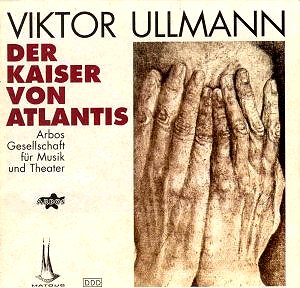Viktor Ullmann was born in Teschen, a town now
on the Polish-Czech border. He served in the Austrian army during
the Great War. In 1919 he resumed studies with Schoenberg who
thought well enough of him to recommend him to that moghul of
Czech musical life in the 1920s, Alexander Zemlinsky. As a result
Ullmann became répétiteur at the Neues Deutsches
Theater in Prague. Like Zemlinsky Ullmann was an admirer of Mahler.
On Zemlinsky's departure for Berlin in 1927 Ullmann became music
director at the theatre of the North Bohemian town of Ustí
nad Labem. There, his own man at last, he mounted
various adventurous productions including Křenek's Jonny
Spielt Auf. His audacity was too much for Usti and soon he
was on his way again. He worked for several years at the Goethe
bookshop in Stuttgart but the rise of Hitler brought that to an
end and he returned to Prague. He was active in Prague's German
community and became increasingly impressed by Berg's softer approach
to the twelve-tone method. Along with Pavel Haas, Hans Krása
and Gideon Klein he found himself in Terezin concentration camp
in 1942. There he met his librettist, the painter and poet, Peter
Kien. Together they produced the present opera with the whole
work scored for seven singers and thirteen instruments including
alto sax, harmonium, harpsichord and banjo. He also wrote a string
quartet, songs and three piano sonatas while in Terezin. He was
killed in Auschwitz on 18 October 1944. Auschwitz was the camp
in which Kien was also murdered.
What of the plot? Lautsprecher introduces the
characters. Harlekin and Death bewail the fact that life and death
have ceased to have meaning. The Trommler (drummer sung by a woman)
calls out the Emperor's declaration of war and tries to lure Death
into working with the Emperor's forces. The Emperor (Der Kaiser,
Overall) is seen alone in his Palace directing his campaigns by
phone. A strange virus spreads and although many are wounded none
can die. A soldier and girl from opposite sides meet on the battlefield
and unable to kill each other fall in love. The Trommler tries
to seduce the soldier from his new love but he will have none
of it. The Emperor, still isolated, stares in the mirror and sees
Death over his shoulder. Death will allow people to die if the
Emperor will be his first victim. The Emperor in resignation walks
off in Death's embracing power.
The music has no languors and the plot and sharply
defined musical characterisation proceeds apace at all times.
The narrative flow has the same vigorous élan and refreshing
individuality as Prokofiev's operas Semyon Kotko and The
Story of a Real Man: a large number of concise cinematic scenes
dissolved one into the other with tireless inevitability.
The musical mix is a strong one. In these pages
there are moments of operetta ecstasy - like Lehár no less
- try the exultant aria for the Kaiser (trs.14, 19) where one
can almost imagine the sound of Wunderlich, Piccaver or Waechter.
Also there is a Weill-like sourness in the notes but the result
is never totally world-weary. Of course there is sarcasm and parody
too - listen to the ripped and torn Deutschland über alles
in the Trommler's aria (tr.10). Sprechgesang and parodistic
laughter all put in an appearance too. This descends into caricatured
horror in the Recitative and Aria in Scene 2 (tr.13). At other
moments (tr.15) Ullmann retreats into a Frank Bridge-like landscape
where there is mildewed fruit on the trees. The acceptance of
death by Overall in the Kaisers Abschied is superbly caught
by Swanson who is every bit as good as Michael Kraus on the competing
Decca. Continuing to surprise to the last Ullmann reserves for
the finale a vocal quartet which has a lofty Beethovenian beauty
with not a sniff of the acrid or the charnel.
The notes in the 47 page insert book are by Vlasta
Benetková. They are thorough and provocative offering and
identifying fascinating linkages and echoes. The libretto is only
in the sung German. No English translation. The rest of the book
is in Czech, german, english andn frecnh. The booklet carries
atmospheric photographs of the ARBOS production as well as chilling
reproductions of the title page and an extract from the score.
Competition comes from the seminal Decca Entartete
series deleted wholesale but recently reissued in Germany and
still available at very favoruable prices from www.zweitausendeins.de
if you are quick. This is on 440 854-2. It is better value from
one point of view in that it also includes three Hölderlin
settings written while the composer was in Terezin. The stellar
cast includes Franz Mazura, the venerable Walter Berry and Iris
Vermillion. Lothar Zagrosek conducts the Leipzig Gewandhausorchester.
And there comes the major significant difference. The Studio Matouš
production is for exactly the small ensemble specified by the
composer. Decca augment the forces to full orchestra and this
is very evident in several tracks. The Decca libretto is given
in German, French, English and Italian. If you have a command
of German, French or Italian you will enjoy the Decca bonus of
Hans-Günter Klein's commentary as well as Paula Griffiths'
stimulating and quite different English-only essay. The audio-stage
for the Decca is, in keeping with the house tradition, wider and
more open than in the case of the Studio Matouš. The tones are
a shade softer (as at tr.6, Das waren Kriege) than the
raw glare of the ARBOS version. The Decca makes a lovely sound
but the bitter-sharp Studio Matouš disc catches the original's
starveling context much better. Each works very well ... which
eloquently says much for Ullmann's strongly imprinted music.
Rob Barnett
